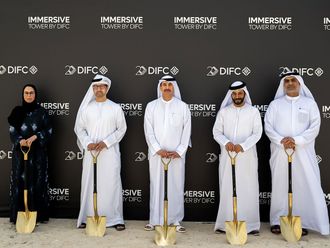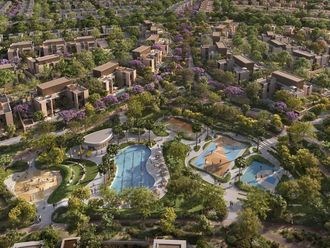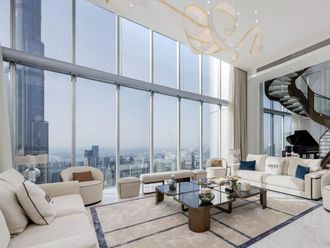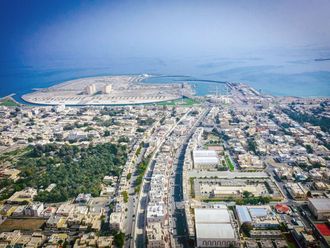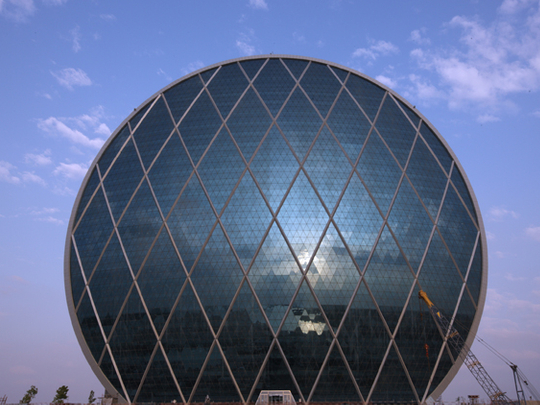
Abu Dhabi real estate was supposed to offer a no-brainer investment opportunity. For after a long building moratorium from the late 1990s, arguably the world's wealthiest city was short of real estate. And when the emirate decided to follow Dubai and open up sales to foreigners, albeit only on long-term leases and not freehold, then the buying opportunity seemed only too obvious.
Yet the global financial crisis of autumn 2008 that ditched the Dubai real estate boom also brought Abu Dhabi's belated boom to a close. Prices fell. Sales have been difficult to achieve and impossible for off-plan. Work slowed on many sites and development of others froze.
For the UAE, 2009 proved a tough year with a modest contraction in economic growth after many years of expansion. Only a sharp recovery in oil prices prevented something worse.
Going forward, investors are bound to look again at Abu Dhabi, the capital of the desert oasis of wealth and security in the region that is the modern UAE. A new and comprehensive report from Investment Boutique, a regional real estate advisory and research firm, is therefore welcome in this still under-researched market.
It provides a sober and realistic assessment of the Abu Dhabi property market, and any serious investor should read the full document. Completely absent is the old sales talk and bullish comments about the government's vision of the future, and indeed that might be considered an error, as this commitment has not gone.
Residential undersupply
To focus on residential prospects first, the report puts market weakness in 2009 largely down to the problems in Dubai and price competition from the neighbouring emirate for long-distance commuter homes.
Some 10,000 to 15,000 commuters a day make the rather perilous high-speed journey from the south side of Dubai to Abu Dhabi. This year, the report says the UAE capital will continue to be plagued by project delays and housing rents and prices still fall. Next year, a recovery in housing demand is expected with rents and prices stabilising. From 2012, rents and prices will rise slightly as a rising supply of property will fail to keep up with renewed demand. Residential property supply is forecast to rise by 17 per cent by 2012 with the 2009 shortfall in supply of 45,000 units falling to a shortfall of 33,000 units by 2012, but still falling short of demand. New laws and regulations expected in 2010 are also expected to make an impact on the market.
As Investment Boutique comments: "In order to attract a healthy international institutional investor base… there will need to be a considerable investment in a framework to provide clarity in terms of property and ownership rights, particularly in strata owned buildings. Further, there will need to be greater comfort over zoning and centralised supply control as well as clear procedures, accountability and enforceability of investor and landlords' rights, irrespective of the counterparty."
Commercial outlook
For the office market, a shortage of Grade A property is already being felt and here the market will be stable in 2010 and improve thereafter. Lower grade office space rents and prices will fall until 2012. The new study notes: "New Grade A office spaces such as the Aldar HQ Building in Al Raha Beach continue to command annual rents in excess of Dh325/ft² as there is a genuine shortage of Grade A office space in the city."
But then: "The majority of the new office supply under construction is in the Corniche and in new master-planned communities with around 70 per cent of it being Grade A space. The new supply is expected to increase office stock by around 50 per cent between now and 2012." Retail space is a different story. Poor retail revenues this year will meet a rising supply of shop units in 2011 and rents continue to fall in 2012. Remarkably, the additional retail supply from 2010 to 2012 is projected to double the gross leasing area in the city.
The Investment Boutique report also considers hotels as a separate class of commercial property for investors. For both 2010 and 2011, a substantial rise in the supply of hotel rooms is going to result in lower occupancy and room rates in the sector. The forecast has hotel occupancy and revenues stabilising by 2012.
Tight supply, an opportunity?
What lessons can investors draw from this lengthy and careful piece of investment research? The simplest conclusion would appear to be that the Abu Dhabi commercial real estate market is becoming saturated with overbuilding in the office, retail and hotel sectors, but that the residential market shows no sign of shifting out of its chronic undersupply position. Does that make buying residential property in Abu Dhabi a good idea? Well, granted the knock-on impact of the Dubai real estate crash last year - and with prices down 50 per cent and the worst global performance among major markets, ‘crash' is the only appropriate description - then investors will be bound to look at neighbouring Dubai for a cue.
The immediate omens from Dubai are not good. There is a huge upcoming oversupply in all market segments while the well-documented debt problems of the city are weighing on the local economy. If Dubai property rentals and prices weaken further this year, then that will exert a similar depressing impact on Abu Dhabi as seen in 2009.
On the other hand, observant investors might take any sign of a recovery in Dubai as the signal to invest in Abu Dhabi property, particularly in the residential market where the supply position is still very tight and likely to remain so for a considerable period. The oil price outlook is the other big factor to consider. A double-dip recession in the global economy could pull oil prices back down again. But in the medium-term, oil supply constraints and ongoing investment in new capacity suggest Abu Dhabi is likely to become even richer thanks to rising hydrocarbon revenues.
Owning property in one of the world's great energy capitals has to be a good investment in the long run and any short-term real estate price weakness is an opportunity.


